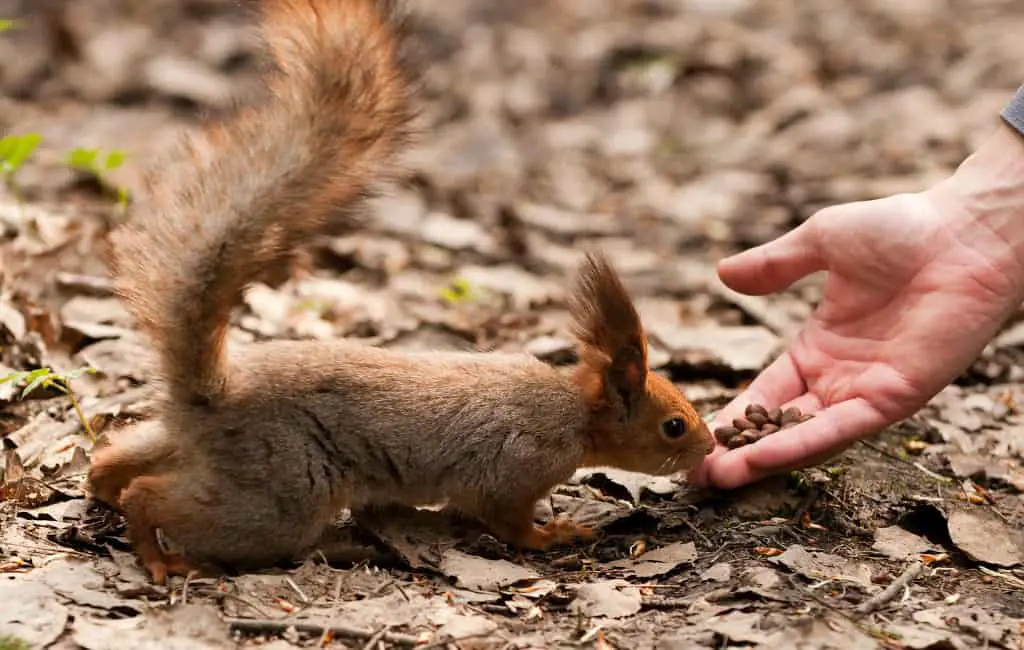When it comes to keeping squirrels as pets, there are two main categories you could consider—wild and domestic.
Wild squirrels are those that live naturally in the wild while domestic squirrels are those that have been domesticated and bred in captivity.
While both types of squirrels may make interesting companions, each also come with its own unique set of benefits and drawbacks.
When considering whether or not keeping either type of squirrel as a pet is right for you, there are numerous factors that must be taken into account such as availability, cost, animal welfare concerns, and legal requirements.
This article will explore these pros and cons further so that you can make an informed decision.
- Related post: 8 Reasons Why Squirrels Make the Best Pets
Wild Squirrels vs Domestic Squirrels
Wild squirrels are found in forests, woodlands, and other wild habitats. Domestic squirrels are derived from their wild counterparts, typically bred in captivity or adopted as rescued animals.
Wild squirrels are typically larger, more skittish, and less used to human interaction than their domestic counterparts.
Wild squirrels require a lot of time and space to adjust to captivity, and they may never be as comfortable with humans as domesticated ones.
In addition, wild squirrels also have greater dietary needs that must be met in order for them to survive – such as specific types of nuts or seeds.
Domestic squirrels, on the other hand, are usually smaller, more docile, and better adjusted to human contact.
They do not require as much attention or space as their wild counterparts, and they can often be trained more easily than wild ones.
Moreover, their diet is typically easier to provide for since it relies mostly on food meant for pet animals like dog food or cat food.
- Related post: Why Do Squirrels Bark? The Hiding Meaning!
Pros of Keeping Wild Squirrels as Pets
Easier to Find/Catch Compared to Domestic Squirrels
Finding and catching wild squirrels can be easier than obtaining domestic ones since they already exist in the wild. This can make them more accessible than other exotic pets that may need to be sourced from special breeders or pet stores, saving you time and money.
More Challenging/Interesting Pets Than Domestic Squirrels
Keeping wild squirrels as pets can provide a unique challenge compared to their domestic counterparts. They can still be trained, but their health history is unknown and behavior might take a bit longer to adjust to living with humans.
Lower Cost Compared to Other Exotic Pets
Unlike many other exotic pets such as lizards or snakes, keeping a wild squirrel does not require expensive cages or equipment for setup; all you really need is food and some safe places for them to hide or sleep. Additionally, there are no charges associated with owning a wild animal like there are for domesticated breeds.
- Related post: 4 Creative Ways! How To Engage With Your Pet Squirrel?
Cons of Keeping Wild Squirrels as Pets
Unknown Health History Since They Are Wild Animals
As wild animals, there is no way to know the health history of wild squirrels. This can make it hard to anticipate any potential issues they may have and requires you to be extra cautious when handling them.
Unpredictable Behavior Compared to Domesticated Pets
Wild squirrels will likely be much more unpredictable than their domesticated counterparts and may require additional patience, positive reinforcement, and training in order for them to adapt to living with people. This can potentially lead to behaviors that are dangerous or difficult to handle.
Difficult To Feed Appropriately in Captivity
It can be challenging to feed wild squirrels appropriately in captivity since there are so many different types of food they would normally eat in their natural habitat that they might not get access to otherwise. This means you’d have to research natural diets thoroughly and adjust accordingly as needed.
Pros of Keeping Domestic Squirrels as Pets

Unhappy cute prairie dog cub suffering, cage on market. Pets for sale. Depressed groundhog asking for food. Funny paws looking for help. Animals standing behind bars. Caged hog family with sad eyes
Easier To Control/Train Than Wild Squirrels
Since domestic squirrels are much more used to human contact, it’s often easier to train them than their wild counterparts. They can be taught basic tricks and commands with consistency, which allows them to adjust quickly and safely to a home environment.
Lower Risk Of Disease or Injury From Becoming Accustomed to Humans
The risk of disease or injury decreases in domesticated squirrels since they are already accustomed to humans and their living environment. This makes them less likely to try and escape which could result in avoidable trauma or stress.
Meet All Legal Requirements for Keeping a Pet
As long as the proper permits are obtained, domesticated squirrels generally meet all legal requirements for keeping a pet in most areas, making them much easier to acquire than wild ones that may require special licenses or ownership regulations.
- Related post: A Guide to Hand Raise a Baby Squirrel: 5 Simple Steps!
Cons of Keeping Domestic Squirrels as Pets
Can Become Too Cozy With People, Making It Harder To Release Them Back Into The Wild If Needed
When a domesticated squirrel gets too used to living with people, it can be difficult to release them back into the wild if needed. Domesticated squirrels may become overly reliant on humans and not know how to survive in the wild, making them more vulnerable to predators and other dangers.
Can Be Financially Costly Depending on Where You Source Them from
Depending on where you source them from, obtaining a domestic squirrel can be financially costly. This could range from paying adoption fees or purchasing a pet store animal, while some sources may even require additional paperwork and permits that come with their own costs.
Can Still Be Prone To Escape Or Get Lost When Outdoors
Even though they’re domesticated, squirrels are still full of energy and can be quite fast when outdoors. As such, they can still be prone to escape or get lost if not supervised properly.
Conclusion
In conclusion, the decision to keep a squirrel as a pet should be made with careful consideration of both pros and cons.
While wild squirrels offer more of an adventure, domestic ones can be easier to control, have less risk of injury or disease and meet legal requirements for keeping pets.
However, they may become too reliant on humans, cost more financially and still be prone to escape or get lost.
Ultimately, it depends on what type of pet you are looking for and what fits into your lifestyle.



